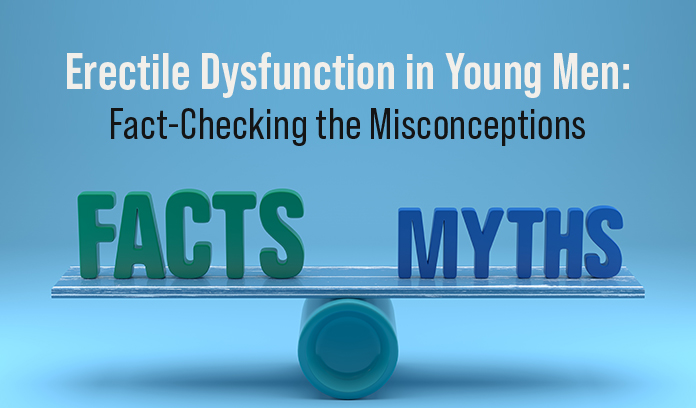Erectile Dysfunction (ED) is a condition that affects men of all ages, including younger generations. However, there are many misconceptions surrounding this topic, leading to confusion and stigma. It is important to debunk these misconceptions and provide accurate information to people to promote a better understanding of ED in young men.
Myth 1: ED Only Affects Older Men
One common misconception is that ED is a condition that affects only older men. However, studies have shown that ED can affect men in their 20s and 30s as well. While the risk may increase with age, other factors like stress, anxiety, relationship problems, and unhealthy diet can contribute to ED in young men.
Myth 2: ED is Always Psychological
While psychological factors such as stress, anxiety, and depression may contribute to ED, it’s not the only sole cause. Physical factors like obesity, diabetes, cardiovascular problems, or hormonal imbalances can also contribute to ED. When analyzing the causes of ED, it’s important to consider both psychological and.
Myth 3: Only Medication Can Treat ED
While Viagra and Cialis are some common medications prescribed for treating ED, they are not the only solution. A big step in managing and preventing ED is changing one’s lifestyle. Improved erectile function may result from regular exercise, a healthy balanced diet, stress reduction techniques, and open communication with a partner.
Myth 4: ED is Inevitable, So There’s No Need to Seek Help
It’s a misconception that ED is a normal part of getting older or that it’s something that young men just have to agree to. ED can be a warning sign of underlying health issues such as heart disease and diabetes. Seeking help from a healthcare professional is necessary in order to understand the root cause of ED and develop an appropriate treatment plan tailored to your needs.
Myth 5: Lifestyle Doesn’t Impact ED in Young Men
ED in young men can occur from various reasons including a sedentary lifestyle, imbalanced diet, smoking, excessive alcohol intake, and drug use. These imbalanced lifestyle choices can lead to obesity, diabetes, and cardiovascular problems, all of which are known risk factors of ED. Making positive lifestyle changes can improve erectile function and overall health.
Myth 6: ED Only Affects a Man’s Physical Health
ED can have a substantial psychological and emotional toll as well and not just impact men’s physical health. Shame, relationship strain, and inadequacy are some common feelings among young men with ED. Addressing both physical and psychological factors of ED is crucial for overall well-being.
In conclusion, by addressing these misconceptions, we can foster a more supportive environment for young men dealing with ED and encourage them to seek the guidance they need for a healthier future.

